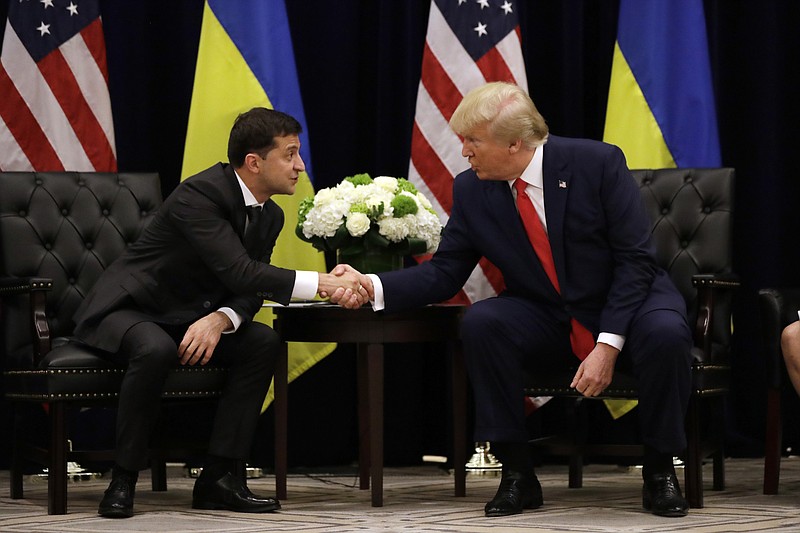WASHINGTON - A standard theme in detective thrillers is that the perpetrator feels compelled to return to the scene of the crime. It's an irrational urge, and readers of such potboilers are often left wondering whether the protagonist secretly wants to get caught.
Trump survived his first effort to solicit foreign political help in his appeals to Russia for damaging information about Hillary Clinton during the 2016 presidential campaign. But soon after Trump was cleared of "collusion" by special counsel Robert Mueller, he seemingly went at it again - this time demanding political dirt from Ukraine's new president Volodymyr Zelenskyy as a condition of delivering military assistance to Kyiv.
Trump evidently thought he'd been exonerated, too, of obstructing Mueller's investigation (though Mueller's report is ambiguous on that question). Perhaps emboldened, he has since appeared to deepen his obstructive behavior, trying to block witnesses from testifying before Congress about Ukraine or any other questionable presidential and personal behavior.
If this were a thriller, we'd suspect that the central character has a compulsion that he doesn't understand or control - and keeps repeating the actions that get him in trouble.
But this is reality, not bedtime reading. And now it's an impeachment investigation, as of Thursday, that requires evidence of wrongdoing rather than psychological speculation about motives. House investigators have been conducting a rapid, well-focused inquiry. But here are two nagging questions that I hope investigators can answer.
' What led to Trump's first meeting on June 20, 2017, with Ukraine's then-President Petro Poroshenko? Ukraine had hired the lobbying firm BGR Group in January 2017 to foster contact with Trump, but nothing had happened and then the door opened. Why?
On June 7, less than two weeks before Poroshenko's White House meeting, Trump's lawyer, Rudy Giuliani, had visited Kyiv to give a speech for the Victor Pinchuk Foundation, headed by a prominent Ukrainian oligarch. While Giuliani was there, he also met with Poroshenko and his prosecutor general, Yuriy Lutsenko, according a news release issued by the foundation.
Just after Giuliani's visit, on June 9, Ukraine's investigation of the so-called "black ledger" that listed alleged illicit payments to former Trump campaign chairman Paul Manafort was transferred from an anti-corruption bureau, known as NABU, to Poroshenko's prosecutor general, according to a June 15, 2017, report in the Kyiv Post. The paper quoted Viktor Trepak, former head of the country's security service, saying: "It is clear for me that somebody gave an order to bury the black ledger."
The New York Times reported in May 2018 that Ukraine had "halted cooperation" with Mueller's investigation. The paper quoted Volodymyr Ariev, a parliament ally of Poroshenko, explaining: "In every possible way, we will avoid irritating the top American officials."
Was there any implicit understanding that Poroshenko's government would curb its cooperation with the U.S. Justice Department's investigation of Manafort, who would later be indicted by Mueller?
' Why was Marie Yovanovitch, the U.S. ambassador to Kyiv, fired in May 2019? Trump, Giuliani and their allies had been attacking her since early 2018, but for what reason?
Why were Trump and Giuliani so eager to dump the ambassador? Here's what Yovanovitch said in her Oct. 11 testimony to House investigators: "Individuals who have been named in the press as contacts of Mr. Giuliani may well have believed that their personal financial ambitions were stymied by our anti-corruption policy in Ukraine."
The former ambassador may have been referring to Igor Fruman and Lev Parnas, two Giuliani clients who were indicted last month for allegedly arranging secret contributions to help foreign governments. (Fruman and Parnas have pleaded not guilty.)
Trump's effort to play politics in Ukraine is described in an ever-widening stream of documents and testimony. The House must now assess whether Trump's behavior makes him unfit to continue in office.
Washington Post Writers Group
